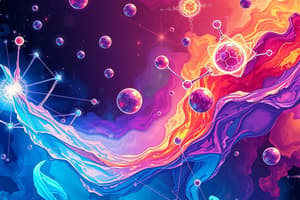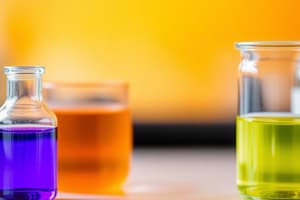Podcast
Questions and Answers
What is the definition of chemistry?
What is the definition of chemistry?
- The study of properties of light and sound
- The study of living organisms and their environments
- The study of matter, its properties, changes, and the energy associated with those changes (correct)
- The study of only solid matter
How is matter classified according to its physical state?
How is matter classified according to its physical state?
- As solid, liquid, or gas (correct)
- By color, texture, and size
- As organic or inorganic
- By its weight and mass alone
Which of the following descriptions accurately defines a solid?
Which of the following descriptions accurately defines a solid?
- Has no definite volume and can expand indefinitely
- Is characterized by rigidity with a fixed shape and volume (correct)
- Is easily compressible and takes the shape of its container
- Has a fixed volume but no fixed shape
What distinguishes a gas from a liquid?
What distinguishes a gas from a liquid?
Which term refers to a combination of two or more elements in a fixed ratio?
Which term refers to a combination of two or more elements in a fixed ratio?
What distinguishes a compound from an element?
What distinguishes a compound from an element?
Which statement correctly describes a mixture?
Which statement correctly describes a mixture?
What occurs during a chemical change?
What occurs during a chemical change?
Which of the following correctly exemplifies the law of conservation of mass?
Which of the following correctly exemplifies the law of conservation of mass?
What accurately describes the properties of a compound compared to its constituent elements?
What accurately describes the properties of a compound compared to its constituent elements?
Flashcards are hidden until you start studying
Study Notes
Introduction to Chemistry
- Chemistry is the study of how matter changes and its associated energy.
- Matter is anything that has mass and volume.
Classifying Matter
- There are two ways to classify matter: by its physical state and by its chemical constitution.
States of Matter
- Solid: Rigid, incompressible, fixed shape and volume
- Liquid: Relatively incompressible, fluid, fixed volume but no fixed shape
- Gas: Easily compressible, fluid, adapts to container shape and volume
Chemical Constitution of Matter
- Element: Cannot be broken down into simpler substances by chemical reactions. Examples: Na, H, O
- Compound: Composed of two or more elements chemically bonded. Examples: H2O, H2, O2, NaCl
- Compounds have properties different from their constituent elements.
- Compounds have constant proportions of elements by mass, known as the Law of Constant Composition.
- Mixture: Can be separated into two or more substances by physical methods.
- Mixtures have variable composition and do not follow the Law of Constant Composition.
- Heterogeneous mixture: Has physically distinct parts with different properties. Example: A mixture of iron filings and copper
- Homogeneous mixture (solution): Uniform throughout with consistent properties. Example: Salt dissolved in water
Chemical Change vs. Physical Change
- Chemical change: Forms a new substance with a different composition. Example: Water decomposing into hydrogen and oxygen gas.
- Physical change: Alters the form of a substance without changing its composition. Example: Water changing from solid (ice) to liquid.
Law of Conservation of Mass
- The total mass remains constant during a chemical change (reaction). In other words, mass is neither created nor destroyed.
SI Base Units and SI Prefixes
- The International System of Units (SI) is used for scientific measurement.
- It has seven base units from which all other units can be derived.
Temperature Units
- Celsius (°C):
- 100 °C boiling point of water
- 0 °C melting point of ice
- Fahrenheit (°F):
- 212 °F boiling point of water
- 32 °F melting point of ice
- Kelvin (K):
- 373.15 K boiling point of water
- 273.15 K melting point of ice
- Conversion formulas:
- °F = (°C x 1.8) + 32
- °C = (5/9) (°F - 32)
- K = °C + 273.15
- °C = K - 273.15
Studying That Suits You
Use AI to generate personalized quizzes and flashcards to suit your learning preferences.



